- News
- Reviews
- Bikes
- Components
- Bar tape & grips
- Bottom brackets
- Brake & gear cables
- Brake & STI levers
- Brake pads & spares
- Brakes
- Cassettes & freewheels
- Chains
- Chainsets & chainrings
- Derailleurs - front
- Derailleurs - rear
- Forks
- Gear levers & shifters
- Groupsets
- Handlebars & extensions
- Headsets
- Hubs
- Inner tubes
- Pedals
- Quick releases & skewers
- Saddles
- Seatposts
- Stems
- Wheels
- Tyres
- Tubeless valves
- Accessories
- Accessories - misc
- Computer mounts
- Bags
- Bar ends
- Bike bags & cases
- Bottle cages
- Bottles
- Cameras
- Car racks
- Child seats
- Computers
- Glasses
- GPS units
- Helmets
- Lights - front
- Lights - rear
- Lights - sets
- Locks
- Mirrors
- Mudguards
- Racks
- Pumps & CO2 inflators
- Puncture kits
- Reflectives
- Smart watches
- Stands and racks
- Trailers
- Clothing
- Health, fitness and nutrition
- Tools and workshop
- Miscellaneous
- Buyers Guides
- Features
- Forum
- Recommends
- Podcast
review
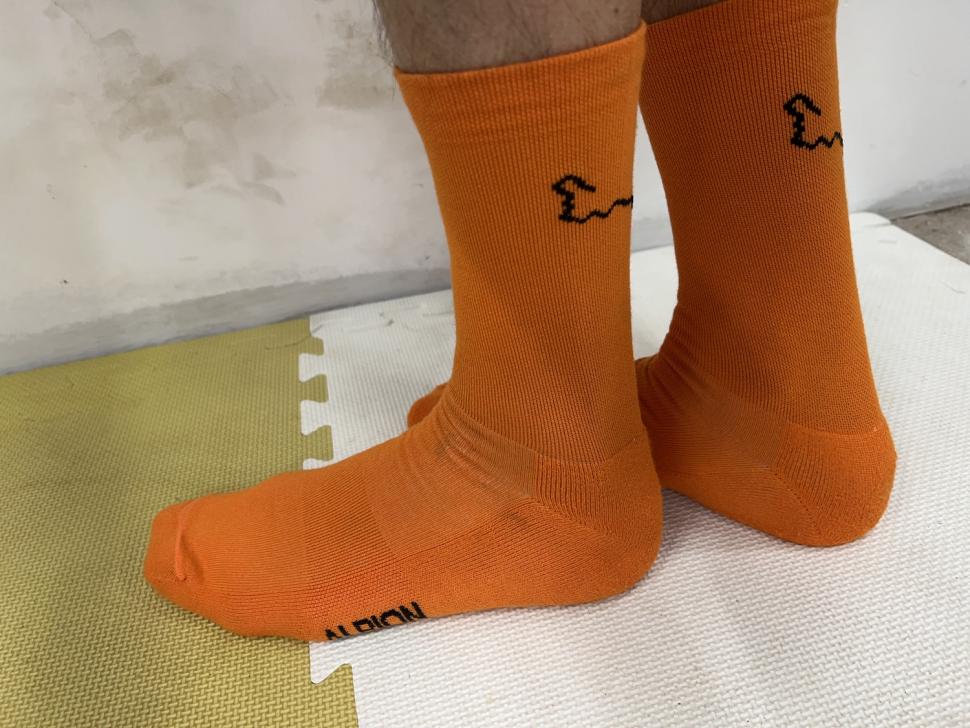 Albion Winter Socks
Albion Winter Socks£20.00
VERDICT:
Brilliant socks for keeping your feet warm and comfortable throughout winter, and in cooler months
Warm
Comfortable
Great fit
Soft
Subtle good looks
A few more colours would be nice
Weight:
61g
Contact:
At road.cc every product is thoroughly tested for as long as it takes to get a proper insight into how well it works. Our reviewers are experienced cyclists that we trust to be objective. While we strive to ensure that opinions expressed are backed up by facts, reviews are by their nature an informed opinion, not a definitive verdict. We don't intentionally try to break anything (except locks) but we do try to look for weak points in any design. The overall score is not just an average of the other scores: it reflects both a product's function and value – with value determined by how a product compares with items of similar spec, quality, and price.
What the road.cc scores meanGood scores are more common than bad, because fortunately good products are more common than bad.
- Exceptional
- Excellent
- Very Good
- Good
- Quite good
- Average
- Not so good
- Poor
- Bad
- Appalling
The Albion Winter Socks are great. They work across a wide range of temperatures, making them ideal from autumn to spring; the synthetic material is soft and stretchy, offering a sublime fit; the cushioned footbed cossets your soles; and the generous height is great for keeping ankles happy on longer legs.
If you're looking for a pair of socks to keep your feet toasty this winter – or, despite the name, much of the year – these Albions should be at the top of your list, especially if, like me, you don't like the feel of merino, as these are totally synthetic: 45% polyester, 35% nylon, 20% elastane.
In a size XXL (EU 44-47/UK 10-13), they fit perfectly on my relatively narrow size 11 feet. They're snug but not tight, the generous amount of elastane offering plenty of stretch. The socks are also available in S/M and L/XL, overall covering sizes from 3 up to 13, which is pretty wide.
The material feels soft, and in the majority doesn't feel bulky, with an almost summer weight to them. Conversely, the padded toe and footbed is very thick and luxurious, and feels like having pillows under your feet. Truly, these are the best winter socks I've ever tried for feel (and I've tested a lot).
There's plenty of height to the Albion socks too, measuring about 15cm from the point at which the cushioned footbed ends on the heel, or about 20cm from the centre point of the heel (Albion doesn't actually state a length). Suffice to say, they are plenty long – some of the longest I've ever tested. If you like more coverage on your ankles/calves, or you've got very long legs, these will suit you very well. They might be a touch too long for shorter legs, mind.
Tested across a range of temperatures, from hovering above the freezing mark, all the way up to the unusually mild weather in the mid teens we've been experiencing in the UK this winter, the socks performed admirably. At the low end, I only needed a pair of thick neoprene overshoes to keep my feet toasty. At the warmer end, my feet were warm but always stayed cool thanks to the excellent breathability of the material. They weren't stinking in the slightest after a long and very wet and muddy ride around the back lanes south of Bristol, either. Top result.
Though people rave about the qualities of merino socks for retaining warmth while allowing your feet to breathe, Albion's animal-free material performs just as well, if not better. And there's very little bulk, too.
Aesthetically, Albion has gone subtle but stylish, with a dual Albion logo on the footbed, and the signature logo line on the upper section. Colours are pretty limited, with black, olive/orange and this bright orange option; a couple of extra colours would be appreciated.
Value
Given the excellent performance these socks offer, the £20 price tag isn't bad, especially when you consider their ability to work across a wide range of temperatures. They would also work well for all kinds of riding, including road, gravel and mountain biking, despite not being advertised as such.
> Suffering cold feet? Find out how to keep your feet warm cycling through the winter
The MAAP Alt_Road Merino Socks perform similarly to the Albion Winter Socks yet cost £5 more (and contain merino wool, which some won't like). Similarly, the Monton Pro Suutu Merino Socks are a decent option at the same price, but they're a bit bulkier.
Conclusion
Overall, the Albions are a great option if you dislike the feel that merino socks offer and you prefer to steer clear of products that use anything animal in them. Even without merino, their performance is brilliant – warm, comfortable, and a great fit.
Verdict
Brilliant socks for keeping your feet warm and comfortable throughout winter, and in cooler months
road.cc test report
Make and model: Albion Winter Socks
Size tested: XXL
Tell us what the product is for
Albion says, "Winter cycling sock constructed using a technical nylon yarn for effective warmth and moisture wicking on your longest winter rides."
Tell us some more about the technical aspects of the product?
Albion lists:
Padded toe and footbed for additional warmth
Albion logo line
Fabric: 45% polyester, 35% nylon, 20% elastane
Made in Italy
Rate the product for quality of construction:
8/10
Material feels thick and well put together.
Rate the product for performance:
8/10
Warm, comfortable and good coverage.
Rate the product for durability:
7/10
So far, so good – only washed a couple of times. One of those was after a very muddy winter ride, where the socks were caked in mud, and they came up looking like new. Slight bobbling on the footbed, but I've seen similar on other socks I've tested, which I believe is simply down to my feet moving around inside the shoes.
Rate the product for fit:
10/10
Perfect fit. Snug on both the foot and calf, but not too tight. Plenty of height for longer legs, or for just more coverage.
Rate the product for sizing:
10/10
Perfect for a size 11, in XXL.
Rate the product for weight:
8/10
Pretty light for warm winter socks.
Rate the product for comfort:
9/10
Thick and luxurious footbed is almost spongey, making it feel very comfortable underfoot.
Rate the product for value:
5/10
How easy is the product to care for? How did it respond to being washed?
After a couple of washes at 30 degrees, the socks still look great. The orange colour hasn't lost any of its zing.
Tell us how the product performed overall when used for its designed purpose
Great fit, very comfortable under the foot and a good length to keep ankles cosy. Surprisingly warm considering they're not the thickest option, and they work well whether the temperatures are near freezing or in the mid teens. Breathability is also very good, and they don't smell after long rides, either.
Tell us what you particularly liked about the product
The cushioning on the sole.
Tell us what you particularly disliked about the product
Nothing.
How does the price compare to that of similar products in the market, including ones recently tested on road.cc?
They're cheaper than the recently reviewed MAAP Alt_Road Merino Sock, being £5 less, and on a par with the Monton Pro Suutu Merino Socks.
Did you enjoy using the product? Yes
Would you consider buying the product? Yes
Would you recommend the product to a friend? Yes
Use this box to explain your overall score
If you dislike the feel that merino socks offer, or you prefer to steer clear of products that use anything animal in them, these are a great option. Even without merino, their performance is brilliant – warm, comfortable, and a great fit. Aesthetically, they're pretty subtle, though the orange definitely gets you noticed.
About the tester
Age: 39
I usually ride: Condor Italia RC custom build My best bike is:
I've been riding for: 10-20 years I ride: A few times a week I would class myself as: Experienced
I regularly do the following types of riding: commuting, touring, club rides, sportives, mtb,
Latest Comments
- imajez 1 hour 40 min ago
- looks like someone has fallen for the steel is real markerting BS. I only care how a bike rides, not what it is made of. I had a lovely steel...
- lonpfrb 3 hours 11 sec ago
That argument is ignorance of the widespread height and width restrictions to be found on the many minor roads that were originally created for...
- David9694 5 hours 15 min ago
cyclists should be made to have number plates - Interesting police video here of the range of illegal number plates - we'd got, as the caption says...
- rookybiker 6 hours 28 min ago
The trailer seems to connect to both ends of the rear axle. Can it do tight corners without dragging the tyre sideways?
- froze 6 hours 32 min ago
Motorists have always been unkind to cyclists, but distracted driving is adding to the problem....
- Destroyer666 7 hours 25 min ago
Have you owned Bont shoes? In my experience even the widest Lake shoes have had a bizarre form of narrowing way too much in the toe area. But the...
- froze 7 hours 52 min ago
Not sure if this is possible, but this news letter goes out all over the world, and some places like Decathlon does not send stuff to America, in...
- Hirsute 8 hours 37 min ago
I'm confused as to why you'd need bib shorts indoors.
- Oldfatgit 9 hours 6 min ago
I'm sure you were being sarcastic... however ... Lewis Hamilton lives in Monaco. Yet another car driver that doesn't pay any tax
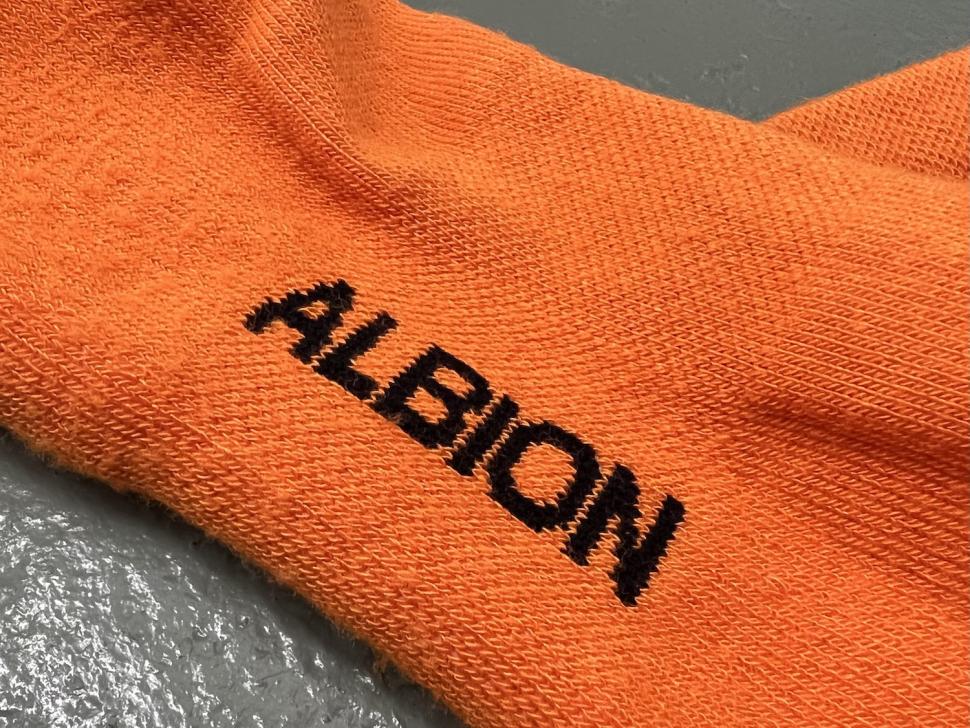







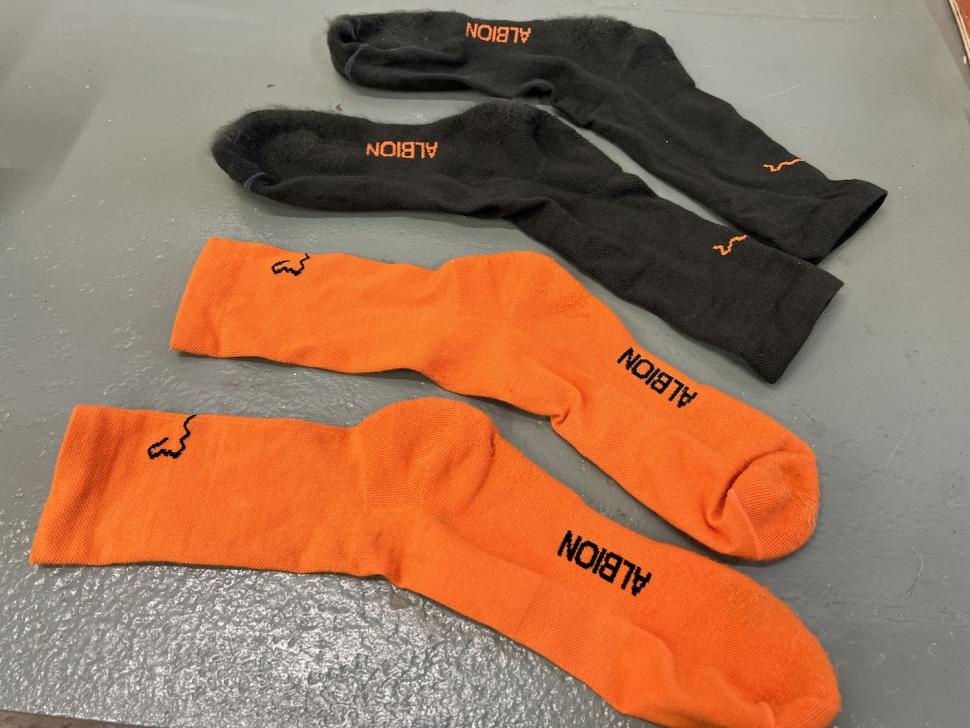
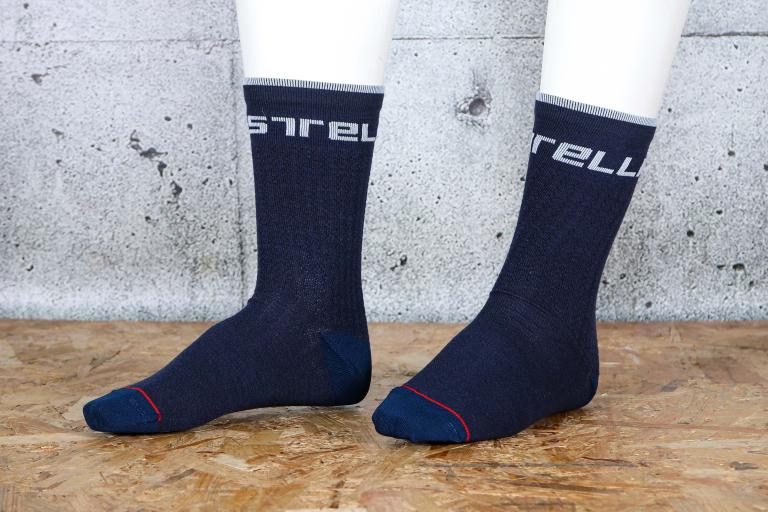
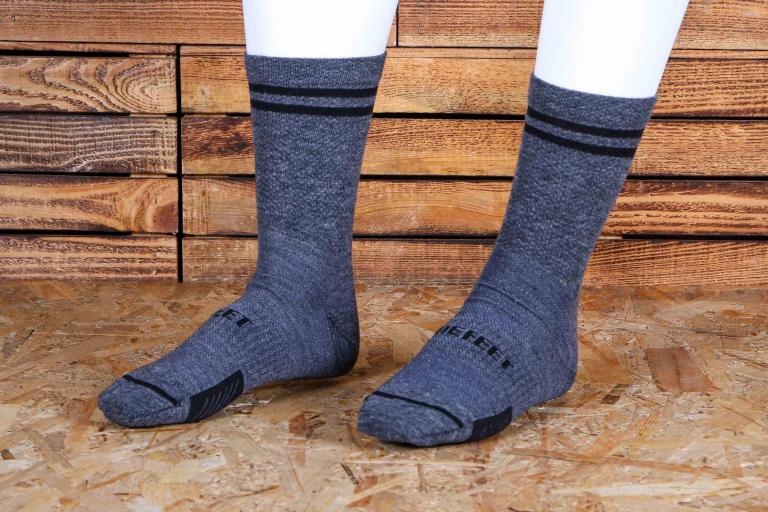
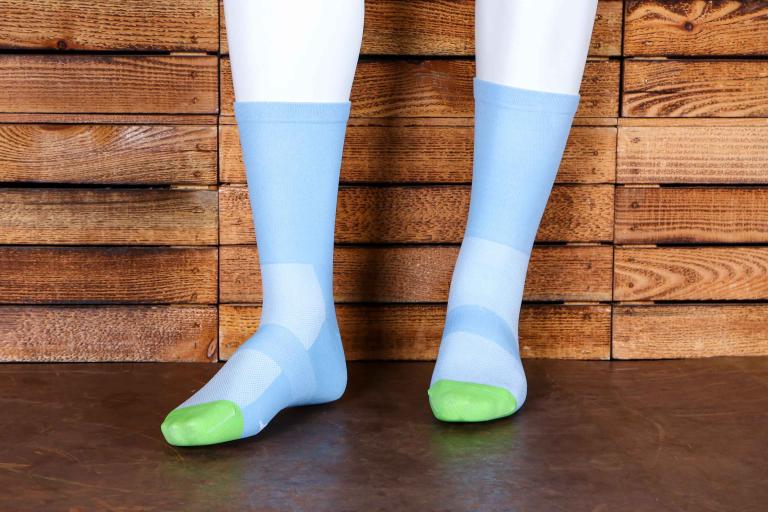
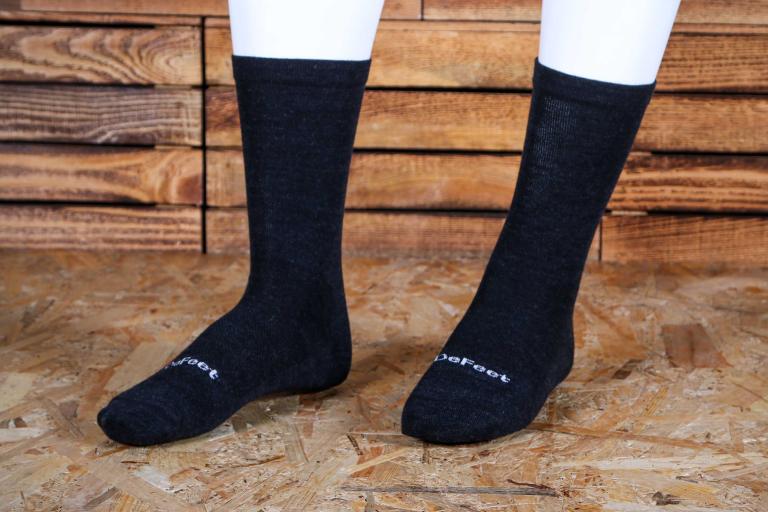
Add new comment
76 comments
I don't think there is a great deal of dogpiling here. I haven't seen any abuse, or even direct criticism of Prosper0 themselves, but there is clearly disagreement. Neither is Prosper0 alone in their view - Rich also seems to be happy to provide a spirited support
I would have thought any article is up for discussion, and therefore any comment up for disagreement
Not sure that they are able to make that choice, or that option has ever been presented to them in the first place. Not quite "cake or death" is it?
Yes the vast majority of meat from sheep is lamb. The ewes are kept to breed until they are worn out, and then sent to the same place as the vast majority of their offspring, and as you point out is generally not consumed by humans (scant comfort as that may be). Apart from paying lipsevice to the publicity gods welfare isn't even a consideration, let alone a driver to farming policy.
Actually as an interesting titbit that I just picked up, there is only one Merino farmer in the UK, according to the Make it British website. And quite a mess of contradictions that "source" is
So it seems that if people are buying UK wool they are essentially buying what whould otherwise be waste, and the product is biodegradable. Surely this is preferable to plastic fibres?
If/when meat consumption drops to the point where there is not enough meat to match demand then it would be a different situation. I think it's unfair to lay the environmental degradation of emat farming at use of wool (form sheep which would exist in the food supply chain anyway)
Generally anything that is grown is more sustainble than anything which is dug out of the ground. (there is a limited amount of material underground to be extracted, while what is grown can be grown again the following year) Provided growing the resource is not so energy intensive it results in fuel being dug out of the ground. Or does not degrade the land used over time to the point wher it can no longer be used for agriculture.
Merino sheep do not do so well in the UK as I undertand it, so merino wool is less likely to be a uk product and the resultant fabric miles are likely not to be sustainable.
In order to meet climate emissions targets I'd like to see a reduction in globalised supply chains to only obtaining what cannot be sourced locally, rather than what can be bought for less with large amounts of transport.
From a quick search, there is Merino wool production in the UK (and exported to the EU). I believe they use Australian sheep (bred for extremely fine wool) and harden them up a bit to deal with our conditions (presumably by selective breeding - I don't think they import each individual sheep).
I recently read that almost 40% of global shipping is to transport fossil fuels around to be burnt: https://billmckibben.substack.com/p/the-happiest-number-ive-heard-in.
I made no comment on that, however it's only waste if it's discarded. if it's sold it is supporting the meat industry. Sadly you can't separate teh two.
You don't farm meat, you farm sheep. Sheep farming is damaging, no matter how you use the product. Those that produce wool are also selling teh sheep for meat and vice versa (that is if they don't just discard the wool)
That generalisation doesn't really add up. The majority of teh British country side has been deforrested for agriculture of one kind or another.
Abroad is no better, degradation of rain forest for livestock, palm oil, bananas etc. Mining is bad ≠ farming is good
Agreed this should certainly be part of an integrated environmental policy
Actually some research has claimed that wool production is in fact more environmentally damaging than many artificially produced fibres. This is due to a number of considerations, including the contribution to global warming created by livestock, both from directly emitted methane and manure degradation (farting and shitting, if you prefer), the deforestation of significant areas in order to provide grazing, the chemical treatments necessary in production both in situ (sheep dip et cetera) and in wool treatment (mothproofing et cetera). It's a complex picture and certainly not as clearcut as natural good synthetic bad.
Really? Do you know where the majority of merino wool comes from? It's not local, that's for sure.
And that's not getting into the ethical side of things. Unlike synthetics, there's a direct cost that comes in the form of animal exploitation.
You think sheep have a wonderful life making your socks?? Think again.
https://www.peta.org/issues/animals-used-for-clothing/wool-industry/
There's no direct cost to the oil industry?
That's before you get into micro plastics and the current dearth of recycling options for mixed synthetic fabrics.
It's possible to buy high welfare merino, it's not possible to avoid all of the above issues with any oil based material.
Alternatively don't use either plastic based or animal based products. Simple really.
https://plantbasednews.org/lifestyle/8-eco-friendly-vegan-fabrics-replac...
And if you still think wool is some magical material that is good for the planet, think again: https://plantbasednews.org/news/environment/report-eco-friendly-wool/
If you were reviewing a product made of hemp or linen then that link may have been relevant.
As it was you reviewed a product made out of oil and noted that feature as a positive.
I don't think there's a single metric by which oil production can be considered superior to wool production so if you're going to praise non recyclable, non degradable products made from fossil fuels you're going to need to provide some better evidence to back up that position.
Point of order: it wasn't noted as a positive - it was just noted.
It doesn't make any value judgement as to whether that should be a consideration for you.
(Although I do have one quibble with that - that 'and' should be an 'or'...)
I thought the inference was pretty clear and given the later comments by the author it appears I inferred correctly.
But, in fairness, it wasn't explicitly stated as being a positive feature so point taken.
Not so much in the form of animal exploitation, which I believe is the context of HollisJ's comment
That is one factor of pollution, however wool is not non-polluting by any stretch of the imagination.
No it's not. The welfare of the animal is (aside from where it can have a monetisable effect on the quality or volume of the end product) is not even a consideration. In that environment "high welfare" is meaningless from the perspective of the animal. It is about making us feel good, not the animal.
It's not possible to avoid these issues with anything we as humans do. All we can do is look at the least worst option - which is in most cases plant-based fabrics.
Nope - grey squirrel fur has to be the best material. As far as plant-based fabrics go, isn't cotton fairly bad with its high water requirement?
There's also the genocidal slave labour aspect of Chinese cotton (20% of world supply).
Whilst we're debating welfare standards for sheep it may be worth acknowledging how our fellow humans are being treated.
If you really need it acknowledging consider it acknowledged.
Cracking piece of whataboutery though.
Whataboutery?
If we're discussing the ethical pros and cons of various materials I would have thought the fact that a huge amount of the global cotton supply is produced by genocidal slave labour would have been pertinent information?
You had your acknowledgement.
If genocidal slave labour was inextricable from cotton production you would rightly have a point. I would have thought though we didn't need to tag "genocidal slave labour of any product is bad, kids" to our comments.
It currently is inextricable for the vast majority of cotton and likely will be for some time.
The global supply chains for cotton are so complex that it is incredibly difficult to guarantee that a garment does not contain Chinese cotton.
With recycled cotton it is impossible.
If you're looking for the most ethical material available cotton has to be pretty far down the list right now.
https://www.bbc.co.uk/news/world-asia-china-56535822
But not to cotton production intrinsically - you tacitly acknowledge that cotton is producible without slave labour. Wool however is not producible without animal exploitation (although as china has a growing Merino industry, and with a nod to your valid point about global supply chains, neither is this likely to be untainted by slave labour....).
As that cotton is already in the environment, you raise a valid question - should we just discard it (burn it, landfill it etc) or is it ethically acceptable to recycle it.
I would say yes to the latter, with the proviso that we aggressively pursue a (political) mechanism to prevent unethical sources tainting the supply chain of new materials. This would require a complex solution the details of which I believe to be out of the scope of this discussion. However what is clear is that it would take vision, will, commitment, resource, and close collaboration with our international partners - at least one of which would be highly reluctant to cooperate.
Which leaves us with the knotty question of what pair of socks to buy. It seems clear that whatever choice we elect, in terms of quantity the best option would be "as few as absolutely possible"
IT's been quite a while since we last conversed Rich, but I must confess it has been fun, and hopefully as thought-provoking for you as for me. Have a great day.
Yes. The least damaging textile is probably recycled cotton.
The case doesn't look good for consumerism. It will (likely) be the death of us, one way or another.
It seems any material and any motorised form of getting around will bring about the downfall of civilisation / further abasement of the shoddy living conditions of most people on earth. If only we could just get by without, somehow?
Maybe not right now. But come May will be sure to see you on teh beach!
If you're worried about animal welfare it's absolutely possible to get wool from sustainable, happy, uk based, organic sheep.
The same cannot be said for single use plastics made from oil dug out of the ground in Saudi Arabia, transported to the UK and manufactured. Is this a hill to die on?
Cool. So tell me - is your life free of single use plastic and oil based products? Or do you only wave that flag when it comes to cycle clothing?
No animal is ever 'happy' having their freedom taken away and exploited. Do you think human slaves living in good conditions were ever happy?
Not cool.
This is a harsh and, I'd say, counter-productive. We mostly try to make the right choices based on the information we have and our understanding of impacts. But it's pointless to reject ideas from others due to insufficient purity.
Did Desmond Tutu ever have a violent thought in the anti apartheid struggle? If he had, would that diminish his moral authority? Has Jonathan Porritt or David Attenborough ever used a cotton bud? Does that mean that they have nothing to say? Have you, Hollis, ever used an animal product, such as a beer that used a fish-based fining agent? Have you ever swatted a fly or crushed an ant? Does anything in your personal food chain impact on animal welfare? How about animal protein in vaccines?
Environmental issues are difficult to get simple answers on. Which is better, polyester, merino, other wool, or plant based fabrics like cotton or bamboo? How can you balance sheep burps against bamboo transport or forest destruction?
This has been a pile on and it's unworthy of the site, especially from one of the reviewers. We should be able to stick to respect for opinions and polite counter-argument.
Respectfully TB I can't see a pileon here, just some different opinions being discussed and argued perfectly civilly.Have I missed something?
"HollisJ wrote:
Cool. So tell me - is your life free of single use plastic and oil based products? Or do you only wave that flag when it comes to cycle clothing?"
That, I think, isn't good. The waving a flag selectively suggestion, along with the implied "you can't make your point unless you can show your own purity from birth".
Some people think you can have happy farm animals (e.g. Prosper0, who I've not read much of), and hence ethical animal products, and some don't (e.g. Capt Badger, whom I hold in high regard). But I think the debate should stay dispassionate.
Life is full of compromise, and none of us has perfect information. We all decide what weight we attach to given factors - animal welfare vs shipping emissions vs use of oil vs use of water (cotton in the dock there) vs unknowns - many of these on my current favourite material (bamboo). And I can discuss that with you without you asking if I've ever worn shoes made of Australian leather or me insinuating that your concerns are irrelevant because you once drank fizzy water from a plastic bottle and binned it in general waste.
Have I become over-sensitive?
Wee bit maybe, I entirely take your points but that doesn't seem a particularly egregious example - a bit silly rather than out and out aggressiveness?
You might want to read up on viscose rayon, which is the fabric green-washed as bamboo.
Here's Patagonia on why they don't use it:
https://eu.patagonia.com/gb/en/stories/why-dont-you-use/story-19681.html
The TL;DR is that the viscose process is the major source of carbon disulphide, a neurotoxin, in the environment.
Pages